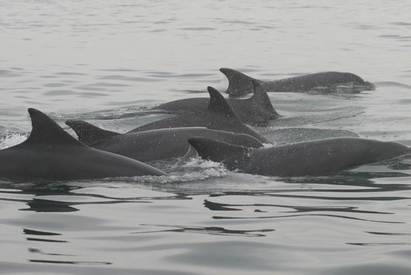|
Coverage of our new Proc Roy Soc B paper: http://news.sciencemag.org/plants-animals/2013/02/dolphins-can-call-each-other-not-name-whistle
0 Comments
New Publication: Vocal copying of individually distinctive signature whistles in bottlenose dolphins2/12/2013 I'm pleased to announce our new open access paper entitled "Vocal copying of individually distinctive signature whistles in bottlenose dolphins” in Proc Roy Soc B
Authors: Stephanie L King, Laela S Sayigh, Randall S Wells, Wendi Fellner and Vincent M Janik Abstract: Vocal learning is relatively common in birds but less so in mammals. Sexual selection and individual or group recognition have been identified as major forces in its evolution. While important in the development of vocal displays, vocal learning also allows signal copying in social interactions. Such copying can function in addressing or labelling selected conspecifics. Most examples of addressing in non-humans come from bird song, where matching occurs in an aggressive context. However, in other animals, addressing with learned signals is very much an affiliative signal. We studied the function of vocal copying in a mammal that shows vocal learning as well as complex cognitive and social behaviour, the bottlenose dolphin (Tursiops truncatus). Copying occurred almost exclusively between close associates such as mother–calf pairs and male alliances during separation and was not followed by aggression. All copies were clearly recognizable as such because copiers consistently modified some acoustic parameters of a signal when copying it. We found no evidence for the use of copying in aggression or deception. This use of vocal copying is similar to its use in human language, where the maintenance of social bonds appears to be more important than the immediate defence of resources. You can access the paper here: http://rspb.royalsocietypublishing.org/content/280/1757/20130053 |
Archives
March 2023
Categories |

 RSS Feed
RSS Feed